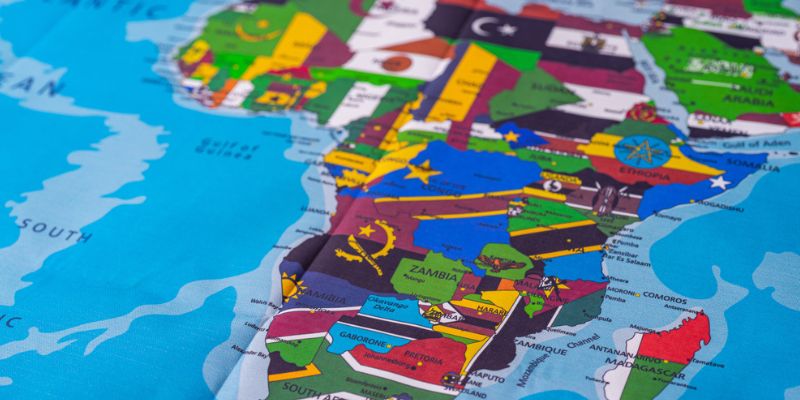
By Anayat Durrani
Investors from Asia, particularly China and India, have traditionally dominated the EB-5 Immigrant Investor program. A continent away, investors from African countries are showing heightened interest in the program, and industry stakeholders are taking notice.
“The demand for the EB-5 program in Africa is undeniably on the rise, with a notable surge in interest, particularly from dynamic markets such as South Africa and Nigeria,” says Zoe Wollenschlaeger, Global EB-5 and Immigration case manager for the Meyer Law Group.
Main factors motivating African investors to apply for EB-5 visas
The African continent has investable wealth in the amount of $2.4 trillion, according to a report by Henley & Partners in partnership with New World Wealth. The millionaire population is estimated to increase by 42% over the next 10 years.
“I work with a number of exceptionally accomplished investors, each possessing a wealth of education and a track record of success, often with ownership of one or more successful businesses,” says Wollenschlaeger. “With a robust foundation in business and investment, these individuals maintain high standards when evaluating projects, ensuring a commitment to excellence and a desire for potential returns.”
The countries that make up Africa’s ‘Big 5’ wealth markets include South Africa, Egypt, Nigeria, Kenya, and Morocco, which collectively represent 56% of the continent’s high-net-worth individuals (HNWIs) and more than 90% of its billionaires.
South Africa has twice the number of HNWIs than other African countries and makes up 30% of the continent’s centi-millionaires. These HNWIs are on the move. According to the report, 400 HNWIs emigrated from South Africa in 2022, and 500 are expected to have emigrated in 2023. Out of 10,885 EB-5 visas issued in 2022, 95 were granted to South African applicants.
“Most South African petitioners appear to be making investments in their children’s education with an eye toward a future in the United States,” says Akindele Akinyemi, co-founder of the Global African Business Association.
Meanwhile, the number of EB-5 visas issued in 2022 to Nigerian applicants was 45. A total of 52 EB-5 visas were issued to Nigerian applicants between September 2022 and July 2023.
Educational aspirations are also a driving force for Nigerians who value higher education.
“Nigerian immigrants are one of the most highly educated racial/ethnic groups in the United States,” says Wollenschlaeger. “The opportunity of studying in the United States, free from the complexities of student visas and with the added benefit of in-state tuition, holds immense appeal for African EB-5 investors.”
Akinyemi says African investors who participate in the EB-5 investment program “do so to give their kids better educational possibilities in the U.S.”
He says there is currently no backlog in the visa bulletin for Nigerian investors seeking an EB-5 visa and that the application process for Nigerians “is quicker than that of Chinese and Indian applicants who are currently facing backlogs.”
Interest in the EB-5 program among African investors also centers around having the freedom and opportunity to expand their business operations in the U.S. Wollenschlaeger says investors can carry on their entrepreneurial endeavors without needing sponsorship from an employer.
Akinyemi adds that through EB-5, investors can gain access to a range of economic opportunities that will aid in the expansion of their businesses.
“This is a fantastic opportunity to use EB-5 projects to build subdivisions in low-income areas or to establish “village” concepts where EB-5 investment is required to build a global community fit for the 21st century.”
Another motivating factor is generational empowerment, Wollenschlaeger says.
“The ability to provide a more promising future for their spouse and children is the primary driving factor for investors. They wish to give their children and family the chance at a future in the U.S. without the challenges faced in their home country,” she adds.
Akinyemi also notes that these investors, for the most part, have backgrounds in hospitality and real estate. He says some of the EB-5 investors he has worked with seek to build home developments in low-income areas of the United States. For example, he has been in discussions with potential EB-5 investors from Nigeria who are interested in investing in Michigan projects like port development, housing, new school construction, and hospitality.
“Not only are they looking for a green card, but they are also interested in these projects because they want to leave a legacy for their kids,” says Akinyemi.
Interest among African investors in the EB-5 program also comes from a dissatisfaction with home country conditions, explains Wollenschlaeger.
“Many investors have shared their disappointment in the governance and financial state of their country. They share a sort of melancholy and hope for a future in which their hard work is rewarded, and their wealth is not threatened by factors outside of their control – such as a political coup or severe drop in currency value,” the attorney says.
Challenges faced by African EB-5 investors
Even with increased interest in the EB-5 program, there are some challenges, notably for South Africans, since the EB-5 Reform and Integrity Act (RIA) of 2022. South Africans are subject to strict foreign exchange controls in place by the South African Reserve Bank (SARB) to track the flow of money coming in and out of South Africa.
“Things have slowed down a little after the change in law,” says Leon Versfeld, a business immigration attorney with Versfeld & Hugo, LLC, who is licensed in and originally from South Africa. “The $800,000 minimum investment has made it a little more challenging to get tax clearance from the South African Reserve Bank for those investors who do not have money offshore.”
Nonetheless, Akinyemi says the U.S. Citizenship and Immigration Services (USCIS) statistics show that participants in EB-5 investments from Africa continue moving forward.
“USCIS application processing methods have been modified for I-526 petitions. For citizens of China and Vietnam, this is likely to result in longer processing periods for I-526; nevertheless, wait times should decrease in developing nations like South Africa and Nigeria,” says Akinyemi.
Trends in EB-5 applications for Africa
Wollenschlaeger says there are some noteworthy trends in EB-5 applications for African investors. She says investors from Africa value trust, familiarity, and success within their network. The lawyer adds they tend to prefer to witness someone they know successfully complete the program or be referred by a trusted contact.
“This signifies a hesitancy to commit their investment without a strong assurance that their funds are in capable hands,” she says.
Wollenschlaeger also notes that “a significant portion of potential investors currently hold non-immigrant visas for the U.S. and express interest in concurrent filing.”
Regardless of whether it’s a tourist or student visa, “there is a clear preference among these individuals to streamline the immigration process while leveraging their existing visa status,” the attorney states.
One recurring concern that Wollenschlaeger has encountered among investors centers around the expected rate of return.
“It is evident that these individuals are not merely seeking an investment opportunity; they are actively seeking reassurance that their financial commitment will yield a worthwhile return,” she says. “This underscores a discerning approach to investment decisions, where the potential for profitability is a major consideration.”
Meanwhile, Akinyemi believes it is essential that African EB-5 investors open new doors for underprivileged communities in the U.S. to draw in foreign direct investment to establish a tax base.
“A strong EB-5 program, for instance, would be extremely beneficial to a community like Inkster, Michigan, where the poverty rate is 37.8%, the per capita income is $19,822, and the median household income is $34,122,” says Akinyemi.
Inkster, a western suburb of Detroit, has no banks, pharmacies, or other health-related facilities, says Akinyemi.
“In a city like Inkster, this is the place where a group of EB-5 investors may come and make an influence that will last for decades,” he concludes.
DISCLAIMER: The views expressed in this article are solely the views of the author and do not necessarily represent the views of the publisher, its employees. or its affiliates. The information found on this website is intended to be general information; it is not legal or financial advice. Specific legal or financial advice can only be given by a licensed professional with full knowledge of all the facts and circumstances of your particular situation. You should seek consultation with legal, immigration, and financial experts prior to participating in the EB-5 program Posting a question on this website does not create an attorney-client relationship. All questions you post will be available to the public; do not include confidential information in your question.








